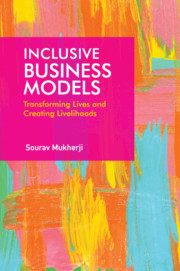Book contents
- Frontmatter
- Dedication
- Contents
- List of Tables
- List of Figures
- Preface
- Acknowledgements
- 1 Introduction
- 2 Vaatsalya Hospitals: Affordable Healthcare in Proximity
- 3 Gyan Shala: Providing Inclusive Education
- 4 Rang De: Creating a Platform for Social Investing
- 5 Labournet: Empowering Informal Sector Labourers
- 6 Selco: Inclusive Model for Energy Access
- 7 Hasiru Dala Innovations: Improving Lives of Waste Pickers
- 8 Reliance Retail: Creating Inclusive Supply Chain
- 9 International Development Enterprise (Ide) Nepal: Developing Smallholder Ecosystem
- 10 Ruralshores: Delivering Inclusive Service
- 11 Gujarat Narmada Fertilizer Company’s (Gnfc) Neem Initiative: A Social Business
- 12 Bringing it All Together
- References
- Index
12 - Bringing it All Together
Published online by Cambridge University Press: 31 July 2021
- Frontmatter
- Dedication
- Contents
- List of Tables
- List of Figures
- Preface
- Acknowledgements
- 1 Introduction
- 2 Vaatsalya Hospitals: Affordable Healthcare in Proximity
- 3 Gyan Shala: Providing Inclusive Education
- 4 Rang De: Creating a Platform for Social Investing
- 5 Labournet: Empowering Informal Sector Labourers
- 6 Selco: Inclusive Model for Energy Access
- 7 Hasiru Dala Innovations: Improving Lives of Waste Pickers
- 8 Reliance Retail: Creating Inclusive Supply Chain
- 9 International Development Enterprise (Ide) Nepal: Developing Smallholder Ecosystem
- 10 Ruralshores: Delivering Inclusive Service
- 11 Gujarat Narmada Fertilizer Company’s (Gnfc) Neem Initiative: A Social Business
- 12 Bringing it All Together
- References
- Index
Summary
The for-profit model of social enterprises has its share of criticism. For example, Anand Giridharadas (2019) argues that the market-driven capitalistic system is largely responsible for creating the inequality that we see around us. Social enterprises are attempting to solve problems of poverty and inequality by embracing principles of market. However, it is unrealistic to expect that the same market mechanisms will be able to solve the problems of inequality that were created in the first place because of them. Market mechanisms will only ensure status quo of inequality and shift the focus away from the responsibility of the government and regulations. Almost a similar argument was made by Karnani in his criticism of Prahlad's fortune at the bottom of the pyramid model, which we discussed in the first chapter. While the social entrepreneurs discussed in this book cannot be blamed for inequalities of the capitalistic system by any stretch of imagination, Giridharadas's argument definitely has a lot of merit. For example, the distress that was witnessed in the Indian microfinance sector, as discussed in Chapter 4, can be viewed as a direct consequence of applying market principles to the sector, which subordinated the social objectives with which microlending was started. Likewise, SELCO's founder Harish Hande has very often spoken about the expectation of markets regarding scale to achieve financial sustainability. In one of the private conversations, he noted that while SELCO was often told to ‘scale up to be financially sustainable’, a large global bank had to fire 11,000 of its employees across multiple geographies to remain financially viable. Thus, there are multiple examples of organizations needing to ‘scale down to be financially sustainable’. One must be careful about the extent one wants to apply market principles to govern social enterprises because, in many cases, wisdom of the markets might do more harm than good.
ROLE OF DIFFERENT ORGANIZATION FORMS
While almost all the case studies discussed in this book are about social enterprises that intend to be financially viable by embracing many market-based principles and best practices of commercial enterprises, they are by no means the panacea for solving the problems of poverty and inequality.
- Type
- Chapter
- Information
- Inclusive Business ModelsTransforming Lives and Creating Livelihoods, pp. 285 - 303Publisher: Cambridge University PressPrint publication year: 2021



